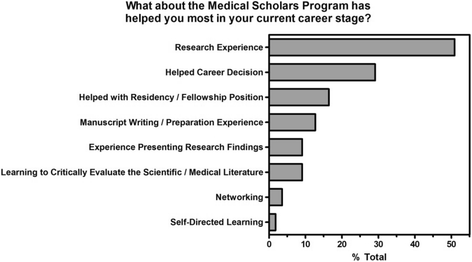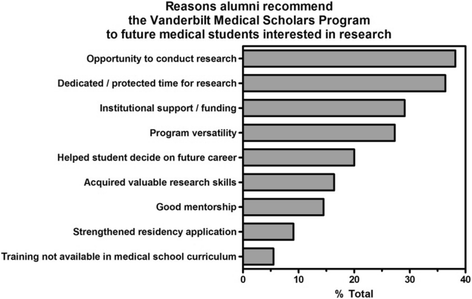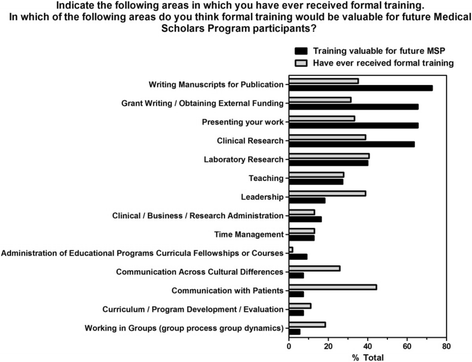Training the next generation of physician researchers - Vanderbilt Medical Scholars Program
- PMID: 29301521
- PMCID: PMC5753449
- DOI: 10.1186/s12909-017-1103-0
Training the next generation of physician researchers - Vanderbilt Medical Scholars Program
Abstract
Background: As highlighted in recent reports published by the Physician-Scientist Workforce Working Group at the National Institutes of Health, the percentage of physicians conducting research has declined over the past decade. Various programs have been put in place to support and develop current medical student interest in research to alleviate this shortage, including The Vanderbilt University School of Medicine Medical Scholars Program (MSP). This report outlines the long-term program goals and short-term outcomes on career development of MSP alumni, to shed light on the effectiveness of research training programs during undergraduate medical training to inform similar programs in the United States.
Methods: MSP alumni were asked to complete an extensive survey assessing demographics, accomplishments, career progress, future career plans, and MSP program evaluation.
Results: Fifty-five (81%) MSP alumni responded, among whom 12 had completed all clinical training. The demographics of MSP alumni survey respondents are similar to those of all Vanderbilt medical students and medical students at all other Association of American Medical College (AAMC) medical schools. MSP alumni published a mean of 1.9 peer-reviewed manuscripts (95% CI:1.2, 2.5), and 51% presented at national meetings. Fifty-eight percent of respondents reported that MSP participation either changed their career goals or helped to confirm or refine their career goals.
Conclusions: Results suggest that the MSP program both prepares students for careers in academic medicine and influences their career choices at an early juncture in their training. A longer follow-up period is needed to fully evaluate the long-term outcomes of some participants.
Keywords: Physician researchers; Research; Training; Undergraduate medical education.
Conflict of interest statement
Ethics approval and consent to participate
Has been provided by Vanderbilt University Internal Review Board (IRB): VU IRB#030925 – Hartert (PI): Outcomes of an in-depth research experience for Medical students: The Medical Scholars Program at Vanderbilt.
Consent for publication
Not applicable.
Competing interests
The authors declare that they have no competing interests.
Publisher’s Note
Springer Nature remains neutral with regard to jurisdictional claims in published maps and institutional affiliations.
Figures



References
-
- Zemlo TR, Garrison HH, Partridge NC, Ley TJ. The physician-scientist: career issues and challenges at the year 2000. FASEB J. 2000;14(2):221–230. - PubMed
-
- Solomon SS, Tom SC, Pichert J, Wasserman D, Powers AC. Impact of medical student research in the development of physician-scientists. J Invest Med. 2003;51(3):149–156. - PubMed
MeSH terms
Grants and funding
LinkOut - more resources
Full Text Sources
Other Literature Sources
Research Materials
Miscellaneous

